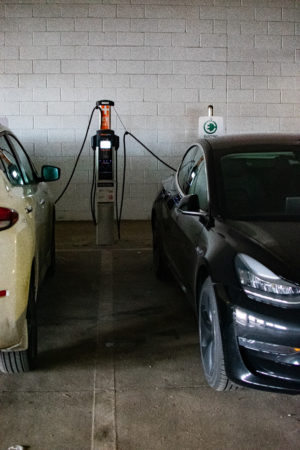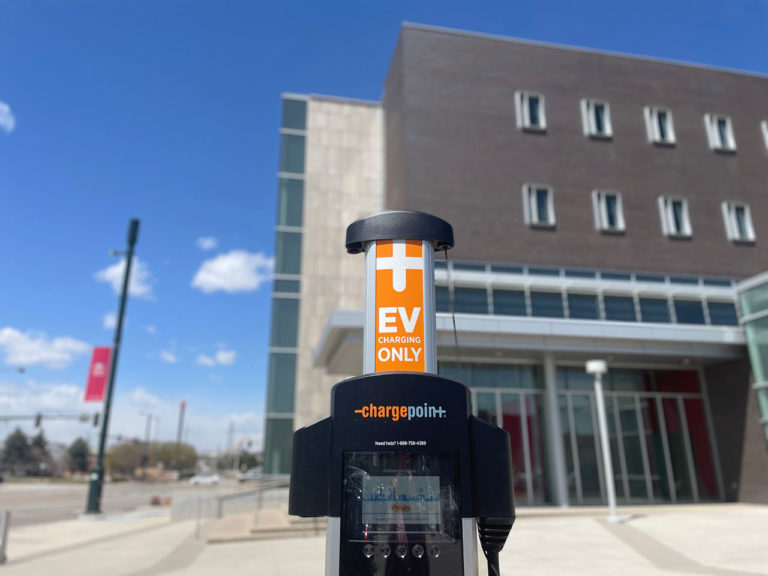Is now the time to buy an electric vehicle?
With gas prices rising and the federal government investing billions in charging stations, interest in electric vehicles is higher than ever.

Ready to make the shift from gas to electric? You’re not alone.
Online searches for “electric cars” reached a record high in March, according to the U.S. Energy Information Administration and Google Trends. Though the topic often gains popularity when gas prices increase, last month’s search volume went right off the charts, despite even higher gas prices in previous years.
In addition to rising gas prices caused by the Russia-Ukraine conflict, several factors are behind the spike in interest. More electric vehicles are available now than ever before. Buyers can choose from 457 models, whereas in 2008, when gas prices soared above $4 a gallon, only one model was available, the Tesla Roadster.
Anxiety about climate change is also driving up interest. Following a dip in carbon dioxide emissions due to Covid-related travel restrictions, CO2 levels skyrocketed in 2021, totaling 36.3 billion metric tons, the highest recorded increase in human history, according to the International Energy Agency.
RELATED: Cities and suburbs face growing wildfire threat
“Transportation in the U.S. accounts for about 30% of our greenhouse emissions, so it’s a no-brainer that that is an area we have to focus on,” said Aaron Brown, Ph.D., professor of Mechanical Engineering at Metropolitan State University of Denver. “In addition, our national security and international policymaking have been heavily influenced by our consumption demands for oil and gas. Reducing our demand strengthens our energy security, and EVs will play a role in this.”
So, why haven’t more consumers made the switch? Potential buyers have cited the initial cost, lack of inventory and inaccessible charging stations among the reasons.
Sticker shock

Even with several models in the $30,000 range, the average cost of a new EV is still over $60,000, compared to gas-powered new vehicles, which average about $46,000. The Nissan Leaf is the cheapest EV, starting at $27,400, and Tesla’s Model 3 — the most affordable Tesla model — held the record for the bestselling electric vehicle in 2021 with a starting price of $43,190.
Rebates and incentives are helping to lower the cost. The federal incentive allows individuals to receive up to $7,500 as nonrefundable tax credits, while the Colorado tax credit provides up to $2,500 for plug-in vehicles and up to $10,000 for heavy-duty electric trucks. Xcel Energy also offers Colorado residents a “New EV Rebate” of $5,500.
“Right now, one of the biggest hurdles to lowering the cost of EVs is finding less costly battery systems, which includes economically sourcing the raw materials, as well as creating low-cost yet high-quality means of manufacture to ensure appropriate battery reliability,” said John Wanberg, chair and professor of Industrial Design at MSU Denver. “As customers seek EVs with higher range, the cost of the vehicle inevitably increases due to the increased battery size and cost.”
Inventory woes
Waiting times have stretched to a year for some EV models. Demand is partly to blame, but a global shortage of semiconductor chips has also caused a lag in production. Additionally, car manufacturers located in Ukraine have been impacted by the war, causing shutdowns and interruptions in deliveries.
RELATED: Russian invasion tests the international order
“Current supply chain issues — especially with worldwide microprocessor shortages — have slowed many things down within the automotive sector,” Wanberg said. “But if someone is interested in owning an EV, having their name on a waitlist now can also help the manufacturer(s) know about the market’s longer-term interest in EV purchases, which can positively nudge manufacturers into directing more of their efforts toward the development of their EV offerings.”
Low battery

According to ChargeHub, Denver currently has 463 public charging ports, 274 of which are free. The site offers an interactive map where users can filter by location, availability and station type, as well as plan trips for longer distances.
Over the next six years, Colorado will receive approximately $65.4 million from the U.S. Departments of Energy and Transportation to build charging stations along seven Colorado corridors, including I-25, I-70, I-76, US-40, US-50, US-160 and US-285.
“Many EV owners mention that one of the benefits of owning an EV is that they don’t ever have to visit a gas station since they can just let their EV charge up at home overnight,” Wanberg said.
However, installation costs can range considerably. While an EV-charging port itself retails for an average of $1,200, if your home’s electrical panel needs to be upgraded, that cost averages $2,750, according to Home Advisor.
“The battery technology, which has directly impacted things like range and charging times, is constantly improving,” Brown added. “The rate of this technology improvement is actually pretty impressive.”
Why wait?
Gov. Jared Polis released his plan for Colorado to achieve 100% renewable energy by 2040, which includes accelerating the shift to electric vehicles. The state is pushing for 1 million EVs on the road by 2030, aligning with Colorado Department of Transportation predictions.
MSU Denver’s Aaron Brown shares the governor’s vision but still thinks consumers would be smart to wait. “In just a couple years, new EVs will have better range and faster recharge times,” he said. “I predict that in the not-too-distant future, the majority of vehicles will be electric. To meet our climate goals, we have to change how we do things.”





